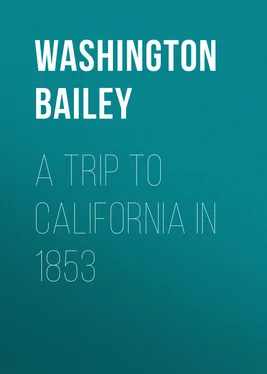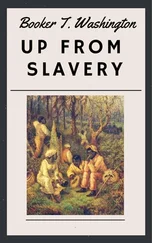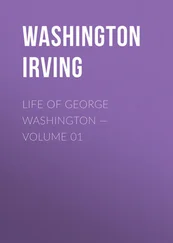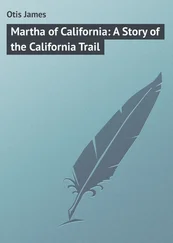Washington Bailey - A Trip to California in 1853
Здесь есть возможность читать онлайн «Washington Bailey - A Trip to California in 1853» — ознакомительный отрывок электронной книги совершенно бесплатно, а после прочтения отрывка купить полную версию. В некоторых случаях можно слушать аудио, скачать через торрент в формате fb2 и присутствует краткое содержание. Жанр: foreign_antique, foreign_prose, на английском языке. Описание произведения, (предисловие) а так же отзывы посетителей доступны на портале библиотеки ЛибКат.
- Название:A Trip to California in 1853
- Автор:
- Жанр:
- Год:неизвестен
- ISBN:нет данных
- Рейтинг книги:4 / 5. Голосов: 1
-
Избранное:Добавить в избранное
- Отзывы:
-
Ваша оценка:
- 80
- 1
- 2
- 3
- 4
- 5
A Trip to California in 1853: краткое содержание, описание и аннотация
Предлагаем к чтению аннотацию, описание, краткое содержание или предисловие (зависит от того, что написал сам автор книги «A Trip to California in 1853»). Если вы не нашли необходимую информацию о книге — напишите в комментариях, мы постараемся отыскать её.
A Trip to California in 1853 — читать онлайн ознакомительный отрывок
Ниже представлен текст книги, разбитый по страницам. Система сохранения места последней прочитанной страницы, позволяет с удобством читать онлайн бесплатно книгу «A Trip to California in 1853», без необходимости каждый раз заново искать на чём Вы остановились. Поставьте закладку, и сможете в любой момент перейти на страницу, на которой закончили чтение.
Интервал:
Закладка:
I was with the party at Cainsville, when an incident happened which I never will forget. We were waiting for word from Jobe Spray, and uncle and all the party except one other man and myself had left the camp and gone to Cainsville. We were left to herd the cattle. While in the town, uncle met a man who owned a farm near the camp. They rode out as far as the camp together, and as uncle's horse was a little thin, having been ridden through from Wisconsin, and the farm was but a short distance away, he picketed out the horse, took off the saddle and threw it away far enough so that the horse could not reach it. He proceeded on foot to the man's farm.
From where I was herding, I could see the horse and went down, thinking that some of the party had come back from Cainsville, and that I would be able to get something to eat as I was very hungry. When I got to the camp, I saw that it was uncle's horse, but could not see anything of uncle. I started back to the cattle when I discovered the saddle in the grass with a two-bushel sack tied to the horn of the saddle. I was interested to know what was in the sack, thinking it might be crackers, so I gave the sack a kick with the toe of my boot. There was a jingling sound as if there were ox shoes and nails in it. So to satisfy my curiosity, I untied the sack from the saddle, ran my hand into it and took out, to my great surprise, a handful of gold. Tying up the sack, I looked in all directions for uncle, but could not see him. I called out for him as loud as I could, three or four time, but received no answer.
After waiting for quite awhile, I took the sack and hid it under some clothing and bedding in the bottom of one of the covered wagons. I then went to a high point near the cattle where I could watch both, the cattle and the wagon.
Along in the afternoon, the folks returned from Cainsville, and my mind was relieved, as I knew there was no further danger of prowlers. My helper and myself, gathered up the stock, and when we got into camp, it was dark and I was hungrier than I had ever been before in my life.
"Come to supper," was a welcome shout and the thought of the gold had vanished. While eating, I heard uncle call out to some of the men:
"Did you see anything of a sack on my saddle horn?"
Several of the men answered, "No," before I could get my mouth emptied and when my vocal canal was free from congestion, I holloed,
"I saw a sack on the horn of your saddle," and he answered back,
"All right Wash," and I told him to wait until I had my supper and I would be over and get it for him.
I went to the camp fire where the men were huddled and asked uncle where he had been and he said that he had walked to the farm across the fields. I asked him how much was in the sack and replied, "Thirty-six thousand Dollars."
I went to the wagon and got the sack. Uncle was badly scared and remarked that it was the most careless trick that he had ever done. There were some Mormons camped a short distance away and he said that if they had found the sack, that he would have been ruined.
While waiting at Cainsville, we finally received word from Jobe Spray that the Illinois party had crossed the river at St. Joe and had proceeded on west and that he would follow them, they having crossed the river two weeks before he got there. He had followed day and night and overtaken them about half way between St. Joe and Fort Kearney, which would be about 150 miles from St. Joe. After receiving the letter, we began to make arrangements to cross the Missouri River. The steam ferry boat had gone up the river after furs, so we had no way to get our stock and wagons across.
While waiting, a fur boat came down the river with three men. This boat was strictly a home made affair. It was built of rough sawed lumber and the bottom and sides were nailed onto the frame with several thicknesses of boards and caulked up with buffalo tallow to keep it from leaking too badly. We secured this boat to get us across.
The process of getting that old boat across the river was a difficult one and as it only could take sixteen cattle at a time, many trips had to be made. A round trip across the river, meant much labor, and was as follows:
After the cargo was put in the boat, it had to be hauled by ropes and pushed by pike poles up the river along the bank, until we were above an island which was in the middle of the river. Then we would cast off from the shore and by means of the oars, pulled for the opposite shore. The current, however, would take the boat in a diagonal direction so we would strike the lower end of the island. Then we would pull and push the old ark to the upper end of the island and again cast loose and finally reach the shore at a point much lower, being carried along with the current. In order to get back, we would drag the boat along the west shore to above the island again and cast off, reaching the lower end of the island. Dragging the boat along the shore to the upper end of the island and crossing, finally reach the east side below the camp. After two weeks of hard work, we managed to ferry all the stock and camp outfit across without serious accident.
CHAPTER II
When we reached the other side, we were in Indian territory, or what is now known as Nebraska, and a short distance north from where Omaha now is. At this place, uncle Joshua impressed on our minds the danger of an attack by the Indians and told us to make plenty of bullets and have our guns well loaded to protect ourselves. Up to this time, I had seen only two Indians. One of them was a squaw named Gripteth, on this side of the Wabash River in Warren County, Indiana. The other one I came upon lying in the grass south of Cainsville, wrapped up in a red blanket. The way uncle talked I thought that we would have to fight our way through. The imagination pictured out every bunch of grass or object in the distance as Indians, but coming closer, we found that we were always unnecessarily alarmed. The scare over meeting Indians gradually wore off, and when we came to the Indians, or rather, when they came to us, I was not as afraid of them as I was of the wolves.
We followed the Indian trail until we came to the Elkhorn River and there we crossed on a willow brush bridge. These bridges lay flat on the water and I did not find out how they were fastened to the banks. Before we reached California, we had crossed over several of them.
We kept a southwest course, following the trail and reached the Platte River, which we followed on the north side. We had traveled about 200 miles in Nebraska. We heard cannons firing and we knew that we were near Fort Kearney and that they were celebrating the Fourth of July.
Uncle Joshua, on a fine bay blooded mare which he had brought from Wisconsin, forded the river after a life and death struggle with the treacherous quick sands along the banks, and managed, by wading and swimming the horse, to get across the river.
After arriving on the opposite bank, he waved his hat in token of his success and started for the fort. He carried with him a seven shot Colts rifle and a five caliber Colts revolver. When uncle reached Fort Kearney, as we afterwards learned, he found that the Illinois train had passed through there two weeks before. Uncle took up the trail and after following for ten days, he overtook them on the south side of the North Platte, a short distance on this side of Fort Laramie near the Wyoming-Nebraska line, at a place called Ash Hollow. The river was forded and the cattle, sheep and horses were now on the right bank of the river.
The night after uncle had left the camp, we were camped near the river on some ground which was level and smooth. Aunt and her two children, Henry and Ellen, were with her in one of the tents. During the night there was a heavy rain or water spout. I was lying on the ground with my boots and coat under my head, and I was awakened by the water which had partly covered my body. I heard aunt crying and calling: "Where is Henry? I can't find Henry."
Читать дальшеИнтервал:
Закладка:
Похожие книги на «A Trip to California in 1853»
Представляем Вашему вниманию похожие книги на «A Trip to California in 1853» списком для выбора. Мы отобрали схожую по названию и смыслу литературу в надежде предоставить читателям больше вариантов отыскать новые, интересные, ещё непрочитанные произведения.
Обсуждение, отзывы о книге «A Trip to California in 1853» и просто собственные мнения читателей. Оставьте ваши комментарии, напишите, что Вы думаете о произведении, его смысле или главных героях. Укажите что конкретно понравилось, а что нет, и почему Вы так считаете.












